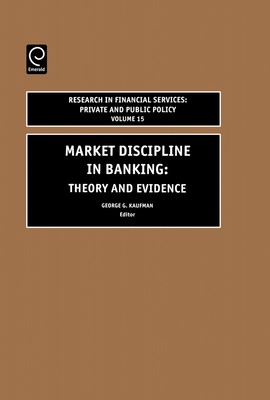
- We will send in 10–14 business days.
- Publisher: Jai Press Inc.
- ISBN-10: 0762310804
- ISBN-13: 9780762310807
- Format: 16.1 x 22.7 x 3.9 cm, hardcover
- Language: English
- SAVE -10% with code: EXTRA
Market Discipline in Banking (e-book) (used book) | bookbook.eu
Reviews
Description
It has become increasingly evident in recent years that the safe and the efficient operation of the banking system cannot be guaranteed by Government regulation and supervisory review alone, regardless of how conscientious the regulator, or well-intended the regulations. Government regulation needs to be supplemented by market discipline. Market discipline requires the existence of at least some "de-facto at-risk" bank stakeholders, who have an incentive both to monitor the financial performance of the banks and to take action to influence bank management if they find performance unsatisfactory. But the concept of market discipline in banking was dormant for many years in the post-World War II era in almost all countries, as the fear of major economic spillover damage from bank failures led governments and regulators to either not failing insolvent banks officially or protecting most or all stakeholders, if they did place these banks in receivership. Only recently has the concept of market discipline been resurrected in banking. The 12 papers in this volume and eight commentaries on the papers discuss whether the resurrection is worthwhile. They consider the basic role of market discipline, how it may be applied to banking and more broadly to large financial institutions of any type, and the evidence of how well it has worked to date and the promise it may have for the future. The authors and discussants represent a wide array of both countries and affiliations - academic and regulatory. Thus, the papers reflect a wide spectrum of experience and thought.
EXTRA 10 % discount with code: EXTRA
The promotion ends in 19d.08:31:12
The discount code is valid when purchasing from 10 €. Discounts do not stack.
- Publisher: Jai Press Inc.
- ISBN-10: 0762310804
- ISBN-13: 9780762310807
- Format: 16.1 x 22.7 x 3.9 cm, hardcover
- Language: English English
It has become increasingly evident in recent years that the safe and the efficient operation of the banking system cannot be guaranteed by Government regulation and supervisory review alone, regardless of how conscientious the regulator, or well-intended the regulations. Government regulation needs to be supplemented by market discipline. Market discipline requires the existence of at least some "de-facto at-risk" bank stakeholders, who have an incentive both to monitor the financial performance of the banks and to take action to influence bank management if they find performance unsatisfactory. But the concept of market discipline in banking was dormant for many years in the post-World War II era in almost all countries, as the fear of major economic spillover damage from bank failures led governments and regulators to either not failing insolvent banks officially or protecting most or all stakeholders, if they did place these banks in receivership. Only recently has the concept of market discipline been resurrected in banking. The 12 papers in this volume and eight commentaries on the papers discuss whether the resurrection is worthwhile. They consider the basic role of market discipline, how it may be applied to banking and more broadly to large financial institutions of any type, and the evidence of how well it has worked to date and the promise it may have for the future. The authors and discussants represent a wide array of both countries and affiliations - academic and regulatory. Thus, the papers reflect a wide spectrum of experience and thought.


Reviews